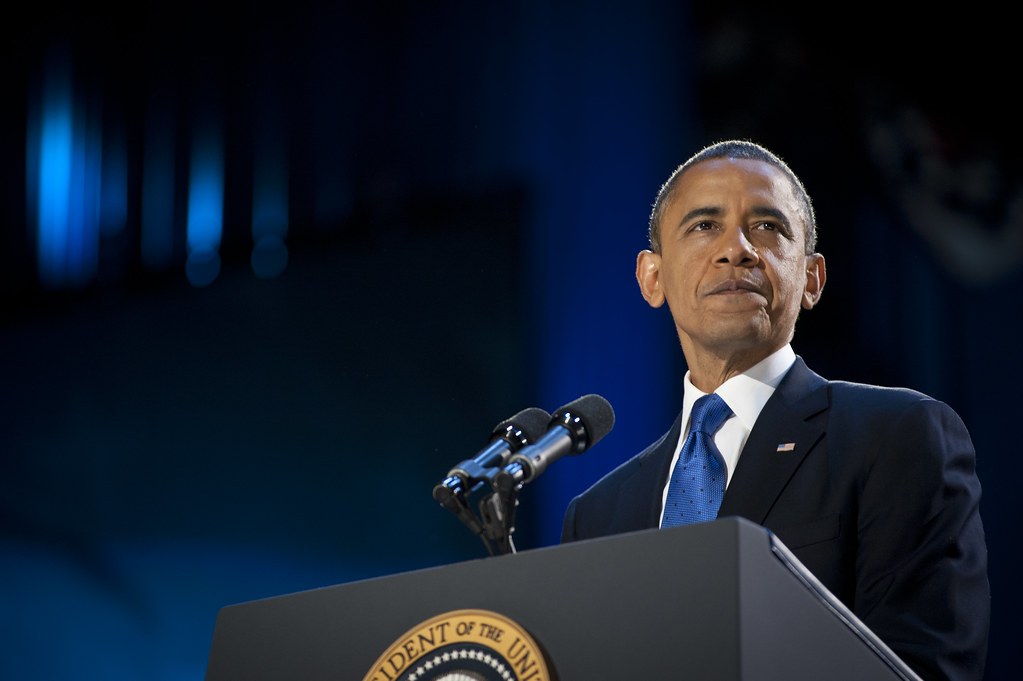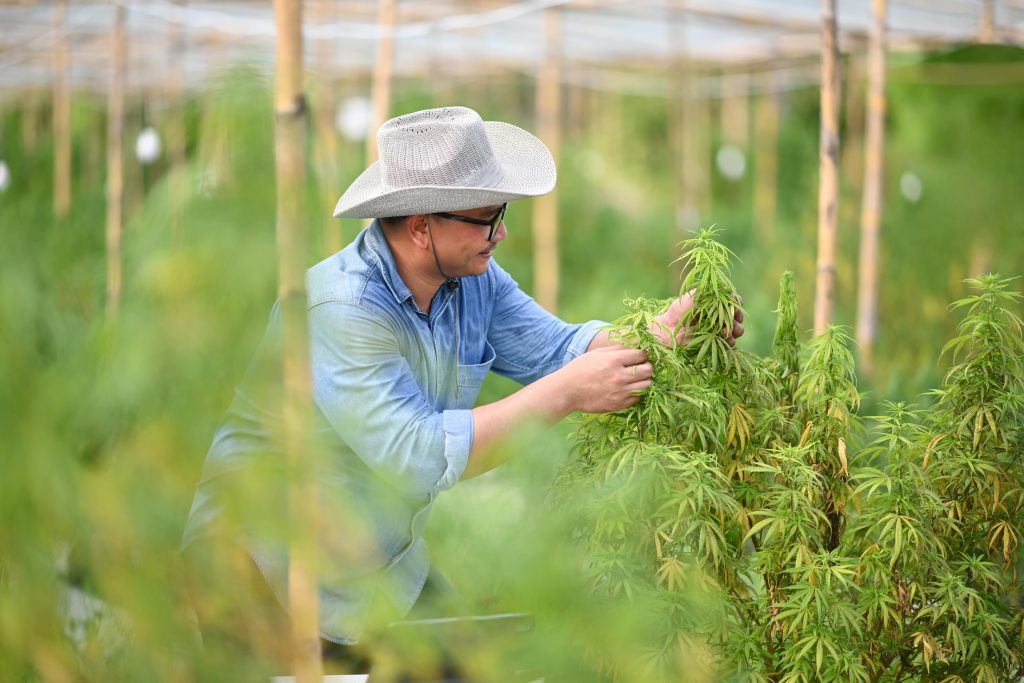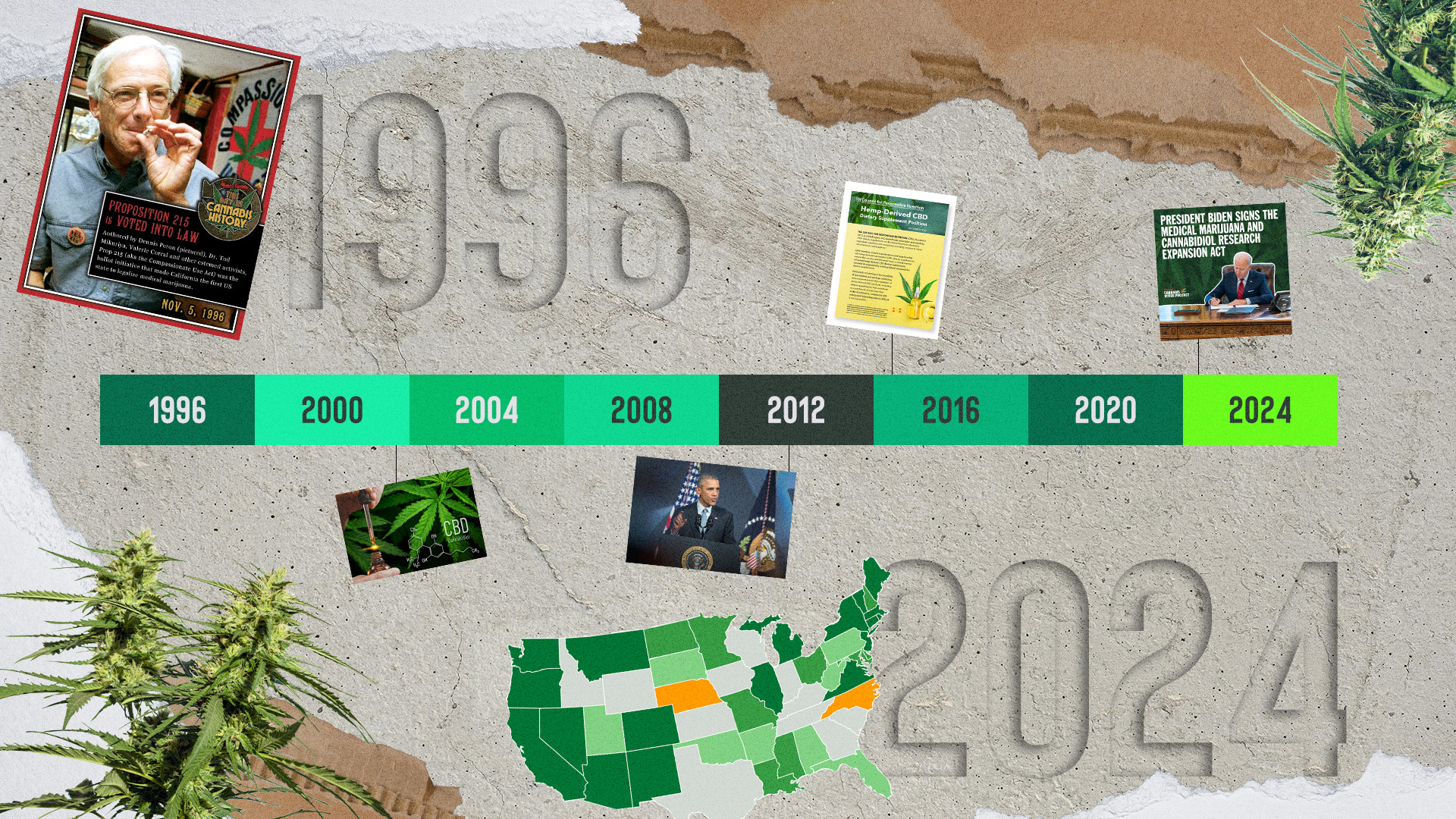With the passage of the Compassionate Use Act in 1996, California turned the primary state to allow authorized entry to hashish for medicinal functions. As we speak, 38 US states regulate and permit for the consumption of medical hashish merchandise, with tens of tens of millions of Individuals utilizing hashish therapeutically and round 90 p.c of voters endorsing medical hashish legalization. With practically three a long time having handed since California’s landmark motion to legalize medical hashish, the place is the business now? This text explores the thrilling authorized and business actions which have taken place since medical hashish first turned a market in 1996 to maneuver the authorized medical hashish neighborhood to the place it’s at the moment.
1996: California Legalizes Medical Hashish
California’s Proposition 215, often known as the Compassionate Use Act of 1996, allowed sufferers with sure qualifying circumstances to domesticate and possess hashish for medical functions as prescribed by a medical skilled. Quickly thereafter, California was adopted by quite a few different states, similar to Alaska, Oregon, Washington, Maine, and Hawaii, whose voters selected to enact related insurance policies between 1998 and 2000.
Nonetheless, medical hashish use was nonetheless restricted within the first few years after legalization. First, intimidation efforts from legislation enforcement made many physicians unwilling to advocate therapeutic hashish to their sufferers. Quickly after Prop 215’s passage, the Drug Enforcement Administration (DEA) threatened to revoke the DEA license (the official registration giving medical practitioners authorized authority to prescribe managed substances within the US) of any doctor prescribing hashish. Though physicians had been in a position to safe a victorious injunction in opposition to these threats in federal courtroom, citing that DEA motion would violate physicians’ 1st Modification protections, many physicians concern writing prescriptions for medical hashish to today.
The opposite impediment for caregivers and sufferers in securing medical hashish was the substance’s availability. Many medical professionals and particular person customers within the 90s lacked the abilities or sources to domesticate hashish crops, and the dispensary system wasn’t established like it’s at the moment. This meant that it was general tougher for sufferers with legit prescriptions to acquire medical-grade hashish.
2009-2018: Obama Administration Deprioritizes Federal Enforcement in Authorized States

Former President Barack Obama, throughout his 2008 presidential marketing campaign, acknowledged his intention to cut back the aggressive anti-cannabis authorized motion promoted in the course of the Bush period. In 2009, upon Obama’s taking workplace, Deputy Legal professional Normal James Ogden launched the Ogden Memo, which declared that the Division of Justice and the DEA would deprioritize enforcement of the federal ban on hashish in states that legalized the plant’s medical therapeutic use. The memo and different related memos produced in 2011 and 2013 instruct federal prosecutors to pursue nationwide hashish coverage enforcement in solely sure instances (typically these involving violence or different criminality), relatively than concentrating on particular person sufferers.
Sadly, in 2018, US Legal professional Normal Jeff Classes determined to rescind these Obama administration pointers. Classes as a substitute acknowledged that selections about how aggressively to pursue cannabis-related violations of federal legislation can be as much as particular person US attorneys inside their jurisdictions. Primarily, this motion gave federal prosecutors across the nation the volition to implement federal legislation in instances involving hashish, even within the states the place the plant and its derivatives are authorized.
2018: Hemp-derived CBD is Federally Authorized

The 2018 U.S. Farm Invoice made a serious step ahead for sufferers receiving cannabidiol (CBD) therapy by eradicating industrial hemp from the record of managed substances scheduled below the Managed Substances Act (CSA), basically legalizing the plant’s cultivation and commerce within the nation.
Why You Ought to Get Your Medical Marijuana Card
Veriheal has glad tens of millions of sufferers nationwide by giving them entry to those advantages
- Bigger buy limits
- Peace of thoughts
- Enhanced authorized safety
- Entry to greater efficiency strains
- Save as much as 25% on hashish purchases
- Skip the road on the dispensary
This laws distinguished hemp as a variant of the hashish sativa plant producing low concentrations of the psychoactive compound in hashish, tetrahydrocannabinol (THC). The 2018 Farm Invoice defines hemp as a hashish plant with THC concentrations of not more than 0.3% contained in any of the plant’s components or derivatives. Earlier than the Farm Invoice, all hashish crops and their merchandise had been outlined as “marijuana” below the CSA, successfully banning all makes use of of the plant. The brand new definition of “hemp” eliminated these low-THC variants of the hashish plant from the record of managed substances below federal legislation.
Consequently, farmers gained the authorized framework to domesticate hemp, a main supply of CBD. This facilitated a surge within the availability of hemp-derived CBD merchandise, contributing to a burgeoning marketplace for therapeutic purposes. With out strict federal authorized complexities concerned, medical hashish sufferers, subsequently, had been allowed elevated freedom to acquire extra accessible and various choices for CBD merchandise that present potential reduction for numerous well being circumstances. That very same 12 months, the primary pharmaceutical-grade hemp-derived CBD medicine treating sure seizure problems, Epidiolex, was authorised for therapeutic use in the USA.
2022: The Medical Marijuana and Cannabidiol Analysis Growth Act

In December of 2022, President Joe Biden signed a brand new legislation referred to as The Medical Marijuana and Cannabidiol Analysis Growth Act (MMCREA), which goals to facilitate effectivity in analysis regarding the advantages of hashish. The regulatory shifts entailed by the act calm down numerous federal restrictions on hashish availability for analysis functions, with the first focus being the elevated cultivation and availability of research-grade medical hashish.
Beneath the MMCREA, the federal government is required to keep up an “adequate and uninterrupted supply of marijuana” for analysis makes use of. For over 50 years, the US federal authorities has contracted the Nationwide Heart for Pure Merchandise Analysis on the College of Mississippi as the only developer and provider of all the nation’s research-grade medical hashish for scientific research. Now, a number of authorised producers are permitted to develop and distribute research-grade hashish for medical analysis trials. This motion helps guarantee the supply of those merchandise for business manufacturing or drug improvement analysis.
The legislation additionally is meant to streamline the approval course of for hashish analysis. The MMCREA promotes expedited DEA licensing approval processes for researchers seeking to receive hashish for medical research in addition to for firms seeking to provide hashish merchandise for the needs of medical analysis.
Total, the goal is that, over time, these provisions will facilitate extra analysis into potential healthcare makes use of, dangers, and advantages related to hashish use. Furthermore, the improved analysis might in the end even present medical suppliers with higher data to advise their sufferers about extra exact dosing approaches and potential interactions between hashish merchandise and different medicines.
Medical Hashish and the Future: Competing with Black Market Operations
The successes of the medical hashish legalization effort have opened a market the place tons of of legit collectives are in a position to produce secure, high quality, and accessible hashish for sufferers’ therapeutic wants. Due to these breakthroughs in legalization, many people throughout the nation should buy hashish with out turning to black-market merchandise and risking arrest.
Nonetheless, the black marketplace for hashish nonetheless thrives and has even been just lately gaining elevated prominence in states the place medical hashish is authorized. For instance, knowledge signifies that California produces practically 5 instances as a lot hashish as the quantity that’s legally consumed, and round 75% of Massachusetts’ hashish gross sales had been projected to happen via the illicit market in 2019.
One extremely vital benefit of unlawful operations is that black market sellers can promote their merchandise at far decrease costs. Due to vital taxes and costs imposed upon purveyors and leisure shoppers of hashish in states like California, Massachusetts, Oregon, Colorado, and Washington, many individuals flip to promoting and buying hashish via unlawful means for higher costs.
Tracing the trajectory of medical hashish from the inception of California’s 1996 Compassionate Use Act to the current resurgence of black-market exercise, we see that the panorama of hashish regulation is complicated and regularly evolving. As we speak, even in states the place medical hashish is authorized and extra accessible, the system continues to be imperfect, and we should carry on adapting new approaches to hashish regulation. The continued story of medical hashish in America places us in thrilling instances the place hashish neighborhood collaboration and forward-thinking insurance policies will probably be essential for navigating the street forward.


